[Updated 7/22 using 7/22 BOFIT Weekly Monitor information] It depends on what you mean by “working”, even if Russian GDP (as reported) hasn’t collapsed yet in the reported statistics yet, the worst is likely yet to come. And some effects won’t be easily measurable.
First, consider what’s happened to GDP:
[Updated graph]
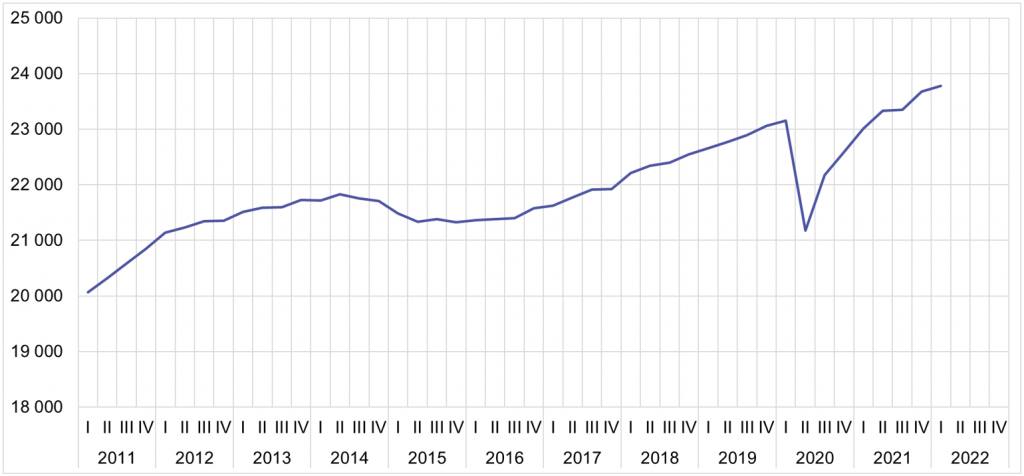
Figure 1-REVISED: Russian GDP. Source: Rosstat and BOFIT via BOFIT. Source: BOFIT. h/t Iikka Korhonen. Supersedes Figure 1 below.
Figure 1: Russian GDP in billions Ch.2000Rubles (red), IMF April WEO forecast (blue triangle), Economic Development Ministry May GDP (light red square), all on a log scale. Levels for 2019Q3 onward calculated using growth rates. Economic Development Ministry estimate as cited by BOFIT. ECRI defined peak-to-trough recession dates shaded gray. Source: OECD via FRED, IMF, BOFIT (July 8, 2022), ECRI, and author’s calculations.
<
Some observers have noted that Russian GDP y/y has not collapsed in Q1 (the latest reported data). Note that 3.5% y/y reading is exactly that — year-on-year growth, which encompasses about one month of the post-sanctions period (the expanded invasion of Ukraine started on February 24th, so only March is in the Q1 post-sanctions data). We don’t have Q/Q growth rates reported by Rosstat, but if I iterate on previously reported quarterly GDP data, then we can infer the path of GDP shown in Figure 1. Figure 1-Revised, as described in BOFIT’s Weekly Monitor today shows a That implies a -1.7% decline +0.5% increase in 2022Q1 GDP. on an annualized basis — pretty big considering only one month of the quarter reflects the sanctions environment.
Are we on the path toward the IMF’s estimate in the April World Economic Outlook? BOFIT cites a May GDP y/y reduction of 4%, which if I assume May represents Q2, and we work off of 2021Q2, shows up as the red square in Figure 1. It does look then it looks like a big GDP drop is still in the cards, perhaps not as big as S&P’s March forecast, though.
Other aggregate measures show the impact more forcefully. Industrial production and manufacturing production down, y/y.
Figure 2: Industrial Production, year-on-year growth rate%. Source: Tradingeconomics.com.
Figure 3: Manufacturing Production, year-on-year growth rate%. Source: Tradingeconomics.com.
In its July 8th Weekly Monitor on Russia (an indispensable resource on this topic), the Bank of Finland’s Institute for Emerging Economies (BOFIT) noted:
Russia’s Center for Macroeconomic Analysis and Short-Term Forecasting (CMASF) finds a larger contraction in Russian industrial output in recent months when military production is excluded. CMASF estimates industrial output fell by 4 % in May. Russia’s lower-house Duma this week approved a law amendment that allows the government to impose special measures on firms to fulfil military needs. Firms can be compelled, for example, to manufacture goods for the military, repair military equipment or provide the military with transport.
So, one needs to look behind the numbers to get a better feeling for the state of the Russian economy.
New car registrations/sales down very substantially.
Figure 4: New car registrations. Source: Tradingeconomics.com.
Wage growth (y/y) negative even as measured inflation (y/y) is way up.
Figure 5: Wage growth, year-on-year growth rate, %. Source: Tradingeconomics.com.
Figure 6: CPI inflation, year-on-year growth rate, %. Source: Tradingeconomics.com.
The combination of these last two figures is to imply a large real wage drop.
While the ruble has recovered to pre-sanctions levels, it has done so with incredibly stringent exchange controls, so much so that it is not appropriate to consider the current rate a “market rate”. Imports are down, although exactly how much down is hard to say, since the government has clamped a cone of silence on the trade data (see Starostina/Carnegie Endowment). Here’s the Kiel Institute’s numbers:
Figure 7: Import growth, month-on-month, %. Source:Kiel Institute, as of July 20, 2022.
One can infer what’s happening by looking at what exports to Russia look like:
Figure 8: Exports to Russia, in USD, 2021M12=100. Source: Macrobond via Iikka Korhonen.
See also Chorzempa/Peterson IIE on differential impact on imports from sanctioning and non-sanctioning countries.
The government does seem to be pressed in budgetary terms, insofar as revenue growth is not keeping pace with inflation, as discussed by BOFIT (July 21st).
In June, the nominal income of the federal budget was only one and a half percent more than a year earlier. The drop in income is really big in real terms, as the increase in consumer prices and industrial producer prices from a year ago was 14% on average in June. [google translation from Finnish].
Despite this, the budget remains in (slight) surplus; but that need not remain the case.
In some ways, the impact on the Russian economy will not be reflected very much in these macroeconomic indicators. Rather (in my own opinion), they will have a profound medium to long term impact on the economy, and the ability for the Russian military to project its power abroad. That is through the impact of trade/high-tech sanctions. As discussed in this Breugel article, the export sanctions applied to Russia are constraining production now (and almost assuredly impacting military production, of high tech munitions, aircraft, even tanks).
Targeted sanctions on specific technologies, financial sanctions and ‘self-sanctioning’ by private companies are effectively decoupling Russia from supplies of high-tech goods. The combination of technological and financial sanctions, public pressure and reputational risk, and the collapse of the Russian economy has made the decision to leave the Russian market easy for companies, and not just those from NATO-allied countries.
Russia has tried to resist technological sanctions by import substitution, but without success. High-tech products are developed using inputs from many countries, but few of them can function without inputs from the European Union or the United States. As a result, a single economy cannot replicate the capabilities of the global network.
In some high-tech goods industries, the effect of sanctions is already being felt. In the long term, sanctions will also severely affect Russia’s growth outlook and ensure that waging war means Russia will cease to be a modern economy. Highly skilled Russians are already leaving, reinforcing the effect of the sanctions.
Of course, how debilitating high-tech export restrictions will be on the development of Russian military equipment is up for debate (see Rand, 2021, e.g.), so no guarantees.
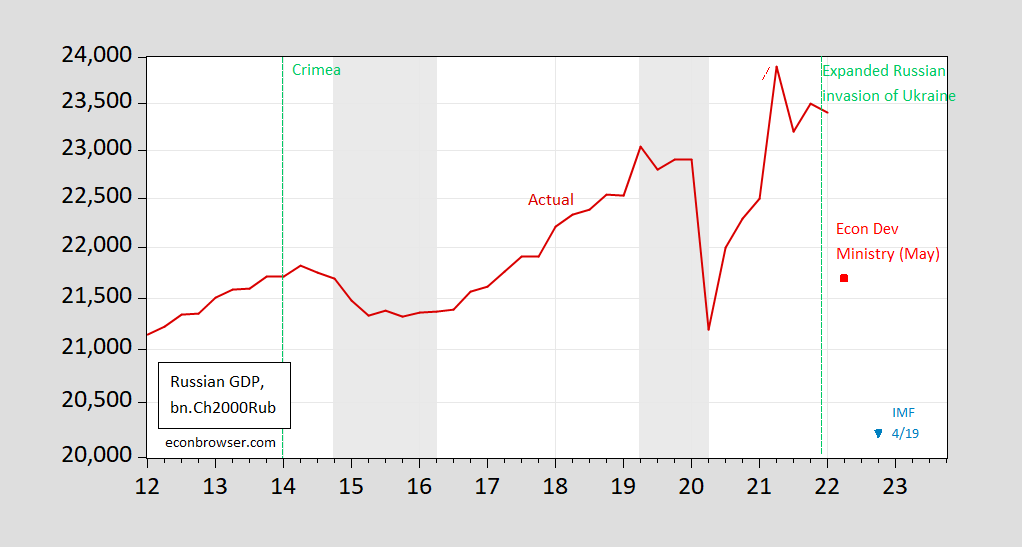
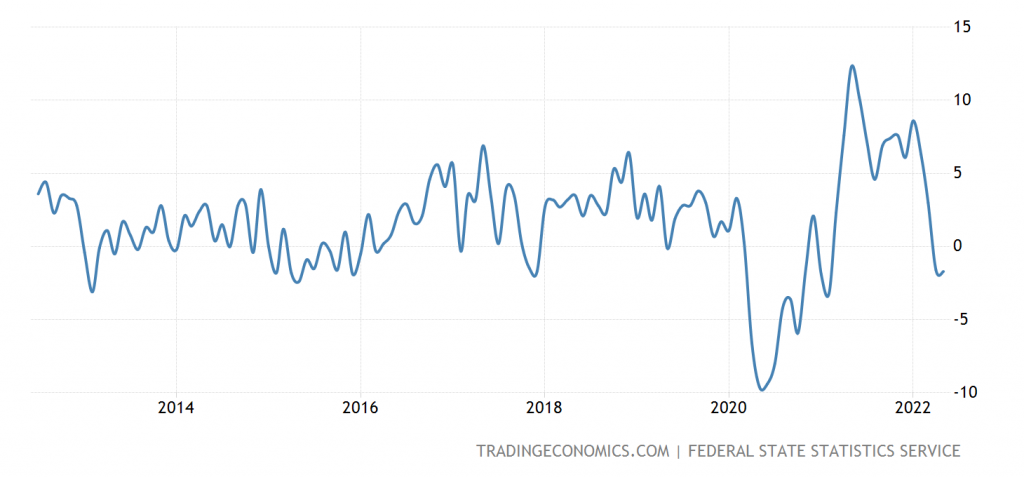
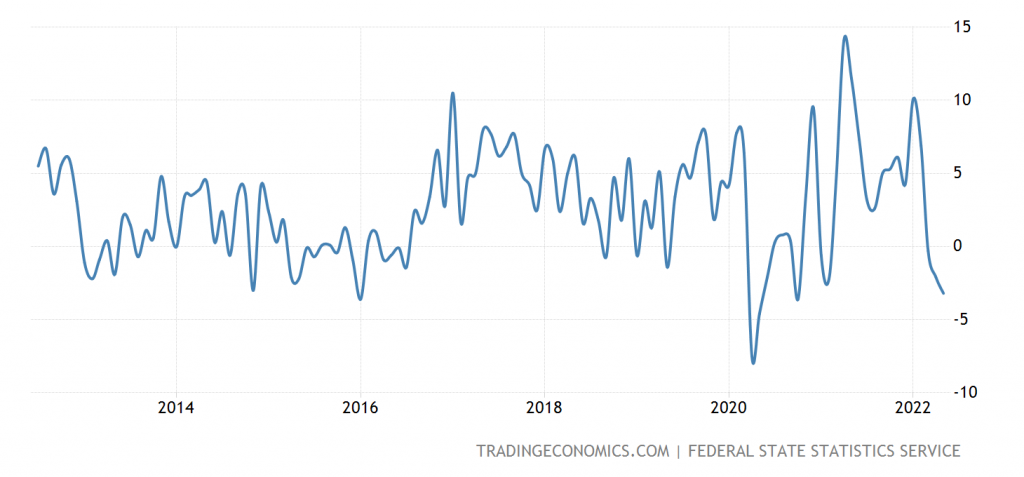
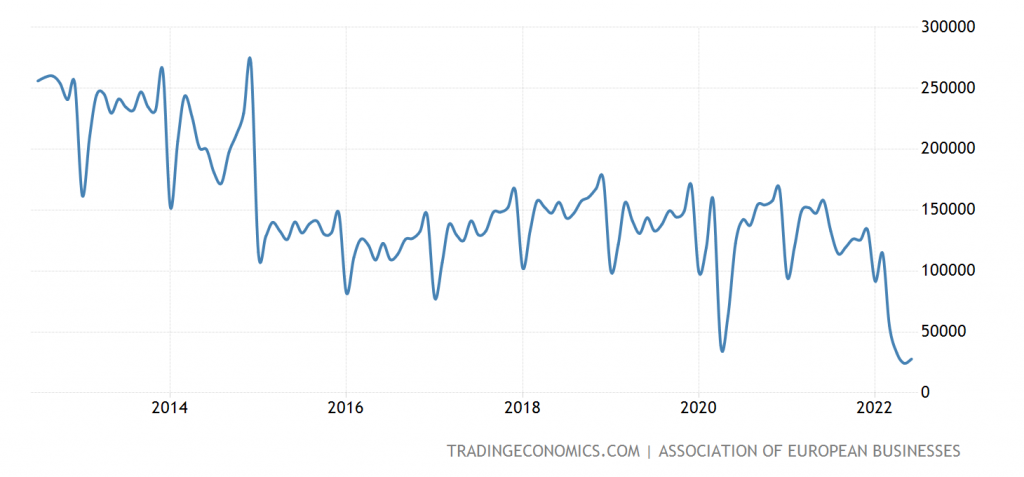
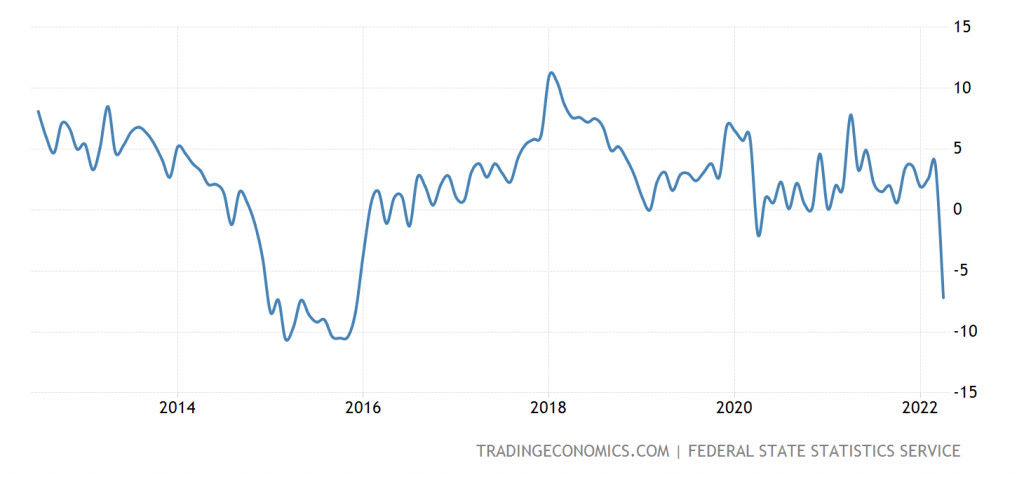
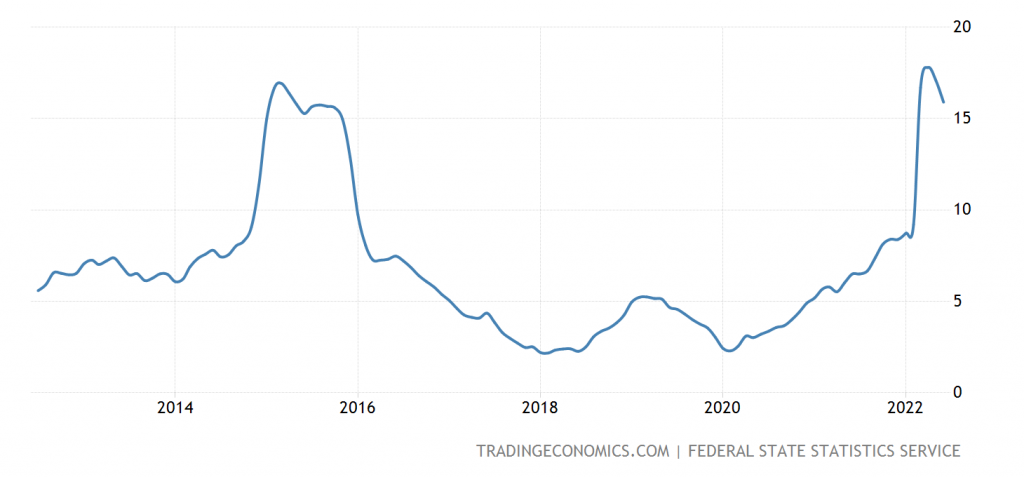
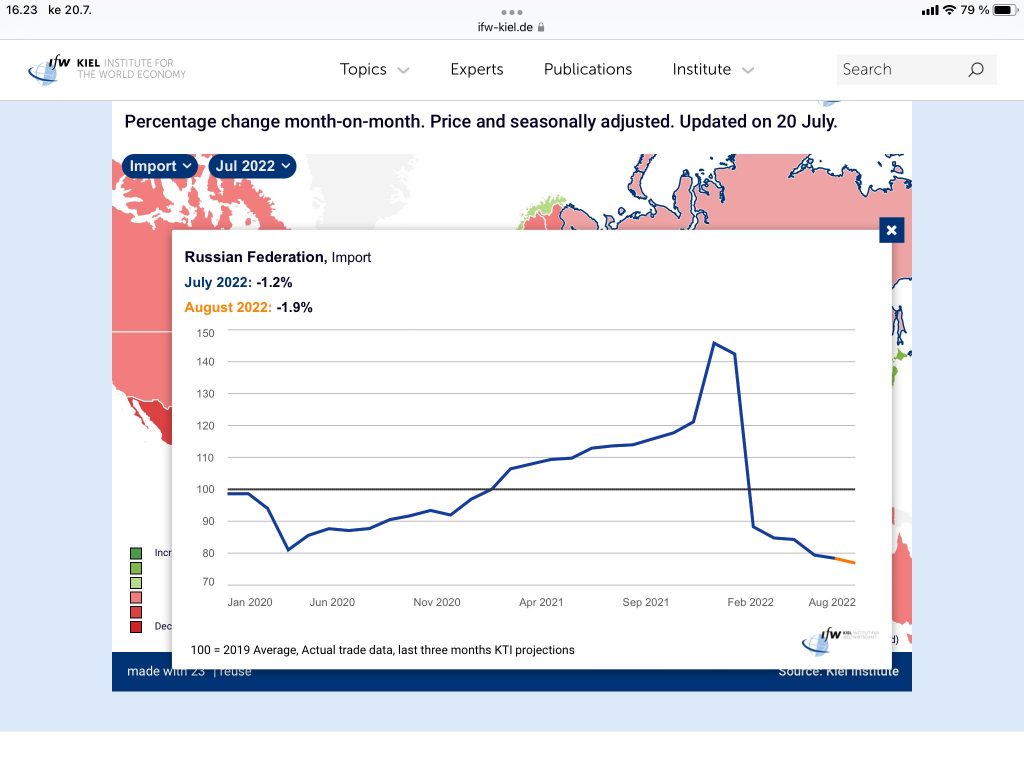
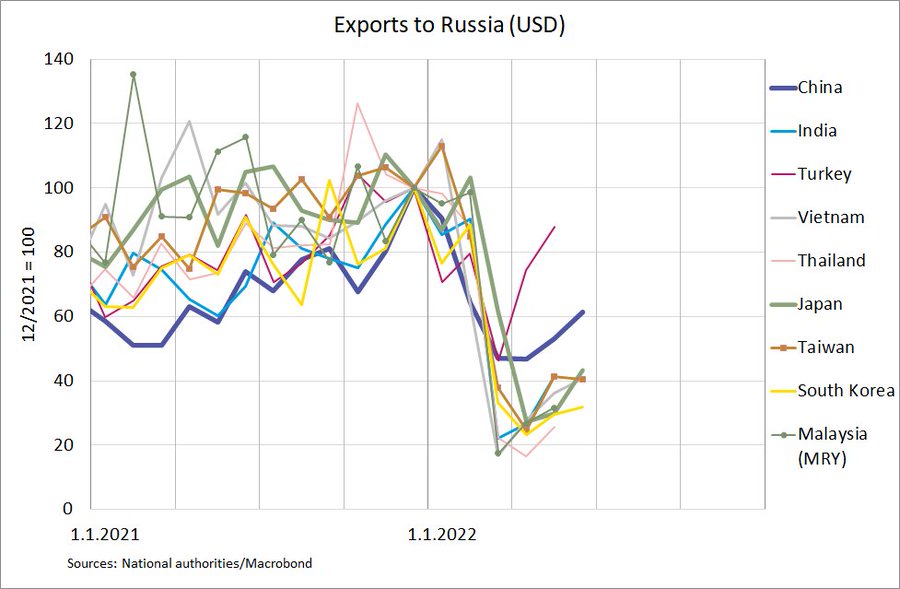
I have a friend who grew up in Russia. He had extremely poor timing and moved back in early February. Last I heard from him, buying a car was out of the question. He was doing OK as some kind of techie in Moscow. He said all kinds of things were hard to find, and everything was delayed. Construction was incomplete where it was in progress due to the inability to get materials. Food was available but the choices were slowly being limited. That was in Moscow, a city that’s being coddled by the Putin government. So, anecdotally, which is all I ever have anyway, sanctions are causing problems for reasonably well off Russians. I can only imagine what it’s like for the less well off there.
I haven’t heard from my friend for a few months now, so I don’t know what’s happening more recently. I doubt it’s better and expect it’s far worse.
@ Willie
Of course most people believe more broad-based pooled data has more breadth and depth than “anecdotal” evidence. But it’s my view that anecdotal evidence still has a value, sometimes higher than people mark it. I hope if you have anymore information from your friend (and it doesn’t break in private confidences) you will share it with us on the blog. He sounds like he has a good head on his shoulders, and maybe the strong pull of emotion brought him back to his homeland. I hope he has some “guardian Angel” watching over him and I will pray for your friend.
Of course 99.99999% of Professor Chinn’s posts are solid or better. But some go above and beyond and reach the gold standard. For whatever it’s worth to Professor Chinn I really thought this is one of his more outstanding posts.
Careful, now. When I raised some of these points in response to JohnH yammering about Western economists getting sanctions’ effect on Russia wrong, he got all huffy and accused me of changing the subject. Please, please stop using economics to assess the effect of economic sanctions.
Yeah, macroduck talked about how bad Russian inflation is, but failed to note that US inflation is fast catching up…
As for how ordinary people are faring, we have an independent report from a Russian-speaking American who actually went to A Russian village and reported on the situation first hand.
https://gilbertdoctorow.com/2022/05/16/life-in-the-village/
And construction shortages in Russia a few months ago? Seems to me that the US had plenty of shortages, too.
https://wolfstreet.com/2022/02/24/inventory-of-new-houses-rise-to-highest-since-2008-amid-stalled-projects-worst-spike-in-construction-costs-ever-recorded/
It’s the propagandist’s role to emphasise how bad things are with your enemy and then gloss over similar problems at home. As for blowback from American decisions, discussion is pretty much taboo, even though it’s becoming increasingly apparent that Europe is in for a long, cold winter, thanks to our sanctions on Russia.
https://www.irishtimes.com/ireland/2022/06/24/cold-cold-winter-in-store-as-a-potential-energy-crisis-looms-in-ireland/
Personally, I’m opposed to Putin’s invasion. But I’m even more opposed to the mass of propaganda supporting US involvement in yet another pointless and futile foreign intervention in support of a consummately corrupt country where no strategic interests are at stake.
JohnH,
Wow, you are really upfront here in your flaming immorality, even as you think you are covering yourself.
Ah yes, “I’m opposed to Putin’s invasion. But I’m even more opposed to the mass of propaganda supporting US involvement in yet another pointless and futile foreign intervention in support of a consummately corrupt country where no strategic interests are at stake.” Yes, you actually wrote this nauseating moral garbage.
Yeah, Putin’s invasion is bad, but not nearly as bad as somebody arguing the US (and presumably its many allies, including now Sweden and Finland) should provide arms to the Ukrainian governmentt to defend its population against having thousands of its innocent civilians slaughtered by this mass murderer whos invasion is based on a pile of lies about Nazis anf NATO threatening to invade Russia, because, well, there is corruption in the Ukrainian government (as if there is none in the Russian one, whataboutism back to you, scumbag), not to mention lacking “strategic interest,” however that is defined. Yes, it is not just the actual supplying of arms to the Ukrainian government that is worse than Putin’s criminal invasion based on lies, it is even just urging that arms be supplied by the US that is worse than Putin’s invasion.
Just when and where did Mephistopholes get to you and what did he offer you for your soul? What you have written here is simply unbelievably evil, no other word for it.
BTW, since you are such an opponent of oligopoly power and corruption, why are you effectively supporting an oligopolistic corrupt leader who is reportedly worth up to $40 billion? Oh, right, you are not supporting his invasion, just more strongly opposing those who oppose his invasion. Got it.
There was a very good article on vox eu some time ago where Mark Harrison pointed out imports to russia have fallen like a rock. This is a key indicator.
“Mark Harrison pointed out imports to russia have fallen like a rock. This is a key indicator.”
Without clear analysis in which sectors the imports have collapsed the reduced imports do not tell you much about the ability of the Russian economy to work or support the war effort in the medium term. Or from a different POV: Key technologies may have no high market share in monatary terms but are an ugly bottleneck for industrial (war) production.
IMHO a very good discussion of economic aspects of the war is provided by the Australian Perun on youtube.
Once again, UlenRussky pops up to defend Russia. What a shocker.
He’s been on here for months portraying himself as German, while showing about the same amount of love for Germany a British World War II vet would have, and telling us Russia can fight war indefinitely. Anyone who believes this commenter is German must also subscribe to CoRev’s weekly investment letter on soybeans.
“Once again, UlenRussky pops up to defend Russia. What a shocker.”
Are you too stupid to understand what I have written? It is about the fact that financial value of trade does not tell you anything about its importance for war economy.
I actually believe that sanctions are working, therefore my reference to Perun on YouTube. But his contribution may be a little bit to complex for you.
Don’t drink an post and do not confuse the funny things in your head with reality. Thank you!
@ UlenRussky
Your comment has very little value. And I welcome Barkley Junior’s embrace of you. Barkley Junior and pgl thought your words were PURE GENIUS just a few months ago And really, honestly, I think the two of them are dumb enough to buy your bathtub of crap two times over. See July 2021:
https://econbrowser.com/archives/2021/07/covid-19-forecasts-one-year-ago-and-today
I mean, at this point, I nearly expect Barkley, pgl, Kopits, and Menzie to tell me what a pure genius you are just right below this comment in the next 16 hours. Come on guys, don’t disappoint the melancholy drunk here.
The cultural expectations of Russians are not the same as those of the US and Western Europe, and that includes economic expectations. Shortages have been the norm there forever and there is no history – ever – of any government other than tyranny.
The “effects” documented in those charts are pitifully weak when viewed through long Russian history. I’d say that, to date, the whole sanctions move have been a big failure.
“I’d say that, to date, the whole sanctions move have been a big failure.”
That is a nonsensical simplification: Cars are a useful proxy for relevant military equipment. Lack of computer chips and machinery limits the ability to produce some important sophisticated munitions or even more basic systems like tanks or infantry fighting vehicles. To replace worn out modern systems with older stuff from depots when your enemy gets better equipment is no way to win…
Again UlenRussky pops up after someone named “w” who has never been here before that I remember, speaks UlenRussky’s exact same schlock supporting Russia. UlenRussky makes a comment which almost exactly contradicts what he said two comments up, repeats a phrase UlenRussky has been trying to embed in Americans’ brains, while mentioning nothing about the amorality of Russians’ mass murder and literal rape of the Ukrainian people.
BTW this is an old internet propaganda stunt, have a troll argue against themselves while repeating back the same argument back to itself in a type of repetitive brainwashing. The old deal if you say “The daytime sky is red” over and over and over enough times that it becomes “true”. It’s classic trumpian manipulation.
Moses,
I am someone who believes Ulenspiegel is German. His views look like that of quite a lot of Germans. He is not pro-Putin, but he is not as anti-Putin as most of us here are. But his anti-nuclear power stands fit with all those people in Germany who think it is a wise idea in the current situation to shut down nuclear power, thus making them rely much more of super dirty coal, not to mention being more reliiand on Putin’s natural gas.
As for the discussion here, it looks to me that you are simply way off. I see no contradiction between his second remarks and his fist ones. In the first one he noted that we need to have a detailed breakdown of which imports are being cut back in order to see the impact, and that these may not be tied to monetary value, with technology being more important. He accurately noted that certain key imports being cut back could impact negatively “Putin’s (industrial) war production.” This is pro-Putin? Does not look remotely likie it to me. This is quite consistent with his reply to w, who does look a lot more pro-Putin than Ulenspiegel.
I have not checked out the youtube he recommends. Maybe it is full of pro-Putin stuff.
As it is, I have not said much about this thread because, as I have said recently here I am highly skeptical about a lot of the data I see on the Russian economy. There is simply way too much we do not reliably know for sure. I have previously mentioned data on oil revenues Russia is getting. I do not know what the sources are of the numbers we see on the internet, and I note we do not know if they are taking account of all the discounts Russia is offering to various countries.
There are some things we do know pretty well, most of them pretty general. Thus we know that the ruble got stabilized, partly because there do continue to be oil and gas revenues, if the precise amounts are unclear. There are also the capital controls and other financial market interventions carried out by the central bank, led by the highly capable Elvira Naibullina, who reportedly tried to resign, but Putin would not let her.
Finally, it also ironically helps that broadly it is clear imports into Russia have plunged. Ironically this helps the value of the ruble. But, as noted by Ulenspiegel, that decline may well end up damaging Putin’s war machine in the near future given the precise details of the sectrorl breakdown, where, again, as with oil revenues, I think the data becomes murky. But there is reason to believe some of this is hitting his war machine, and in the near term.
As for the Russian people, well, it is true there has long been a history of shortages justified by talking about national security. Putin is playing into that with his attempt to pretend this is WW II all over again, and with him indeed having successfully shut down pretty much all of the independent and semi-independent media that was operating there prior to the invasion.
Anyway, this claim Ulenspiegel is actually Russian has about as muc credibility as your claim that ltr is male, and your inability to figure out that Ulenspiegel was actually pointing out that Putin may be hurting due to the reduction of imports does not speak well for your analytical powers.
“I am someone who believes Ulenspiegel is German. His views look like that of quite a lot of Germans. He is not pro-Putin, but he is not as anti-Putin as most of us here are. But his anti-nuclear power stands fit with all those people in Germany who think it is a wise idea in the current situation to shut down nuclear power.
1) Yes I am German as German can be.
2) I am scientist and earn my money with data analysis, therefore I check numbers before posting.
3) My spare time projects are military history and energy transition, I usually try to apply here the same scientific methadology as in my job, i.e. get relevant numbers, but them in a ueseful context.
3) I am nowhere pro-Russian, quite contrary, However I think about efficiency of investments (this also means sanctions) quite hard and do not assume that trade volume per se is a relevant indicator in a war situation. Again check the Australian guy Perun on YouTube.
Your “Maybe it is full of pro-Putin stuff.” is stupid as stupid can be. 🙂
4) And do yourself in case of nuclear power the favour and argue with hard numbers: Nuclear power dies for simple economic reasons it is quite funny that you as academic economist do not get it. E.g. check the annual investments and net effect of additions for new capacity in case of nuclear power and PV/wind.
5) In Europe the few German NPPs are not the issue, the high number of not working French reactors are, again, try to argue with physical reality, do not use your personal opinion as substitute for hard available data. OK?
6) My advantage in case of energy transition is that the academic discussion in Germany was already better in 2010 than what you find today in the USA. That had reasons you should try to understand.
Come with hard numbers that support your position, only bein pro-nuclaer is not sufficient in a serious discussion.
Addendum, I expect something like this or hard arguments why my conclusions based on these numbers are wrong.
(It only requires high school physics).
Status 2020:
NPPs 362 GW generated electricity 2553 TWh 7.00 TWh/(GWa)
windpower 733 GW generated electricity 1591 TWh 2.17 TWh/(GWa)
PV 707 GW generated electricity 856 TWh 1.21 TWh/(GWa)
1 NPP (1 GW, CF 80%) generates 7 TWh electricity per year.
3.2 GW windpower generate 7 TWh electricity per year.
6.0 GW PV generate 7 TWh electricity per year.
Added net generation capacity in 2020:
NPPs 1 GW 1 reactor
windturbines 126 GW 40 reactor equivalents
PV 138 GW 23 reactor equivalents
Projections for 2030, optimistc scenario for nuclear energy, mainstream for wind and PV:
NPP: 5GW net addition per year: 362 GW + 50 GW = 412 GW
412 1 GW reactor equivalents (2880 TWh),
net addition after decade: +50 reactors, -> +350 TWh/a
wind power with 7% increase per year: 730GW * 1.07^10 = 1440 GW
450 1 GW reactor equivalents (3150 TWh),
net addition after decade: +220 reactors, -> +1500 TWh/a
PV with 15% increase per year: 707 GW * 1.15^10 = 4000 GW
670 1 GW reactor equivalents (4690 TWh),
net addition after decade: +550 reactors, +3800 TWh/a
Sorry, Ulenspiegel, but your numbers are irrelevant and do not forgive the incredibly stupid hysteria that has taken over so much of German opinion and led you all to start shutting down existing reactors after Fukushima, thus massively increasing your use of coal and jacking up the price of electricity all over western Europe. Funny how you do not mention coal or natural gas numbers in what you provided.
In the US there are almost zero new nuclear power plants being built because they are expensive and take so long to build. This might be able to be overcome by using much smaller units, such as are being purchased now in Saskawatchewan. But the issue is notibuilding new plants, certainly not in Germany.
The issue is this completely insane policy of shutting down your existing plants, more utter irresponsibility, indeed throwing you more into dependence on V.V. Putin. I am all for expanding new capacity to be wind and solar, but shutting down existing nuclear plants that are not causing any problems, especially in the current situation, is exactly what makes so many people in other countries look at you and your compatriots and have trouble taking seriously your commitment to really standing up to Putin and his invasion of Ukraine.
You’re living in too small of a world, Moses. Worrying about the identity or motive of a couple of posters on some obscure, virtually unknown posting site is not way to live. And yes, I have posted here before, though seldom, and I am not anybody other than myself and the point I made stands until disproven by facts, not opinions about who said what or what somebody’s “motive” might be.
The sanctions, to date, have done very little. Perhaps they will have a long-term effect… or perhaps not. You can make either case.
Two people show up here. “W”, who repeats everything UlenRussky says, and Barkley Rosser. Again “surprise!!!” I type about 3 sentences and I get “War and Peace” in response. Seems I “hit the mark”. Observers may come to their own conclusions.
The only thing missing in this part of the thread is Menzie going “yeah…. but really simple guy, Barkley has a PhD he got 60 years ago. Be quiet now Sir”
Moses,
We get it that you are almost as bad as CoRev at not getting it when you have made a complete fool of yourself and nobody agrees with you, but you go on and on and on. Has anybody here ever agreed with you that Ulenspiegel is Russian or that ltr is male? No. But you keep on and on and on.
And here you fell flat on your face in a full CoRev style with your total misreading of what Ulenspiegel meant. He was indeed pointing out the vulnerability of Putin’s war machine to having certain imports cut off, but you somehow thought he was spouting some sort of pro-Putin propaganda. Just how dumb have you been while reading this stuff here?
Moses,
BTW, you are not quite as stupid as CoRev. He is fully into the sub-basement. You are merely prowling around in the basement.
You are only cultivating your paranoia and ego, Moses Herzog, you do not contribute in ameaningful way to the discussion.
I have presented hard numbers, you can show that they are wrong or put in a wrong context. You do nothing of this.
With your behaviour you are useless as tits on a bull in a serious scientific discussion.
The most consequential harm to Russia will be in the long term. The loss of highly skilled Russians will never be fully reversed. Those people will move to better places and settle there for good. The degradation of Russias military with loss of highly trained people and large amounts of military stuff, will take time and money to replace.
Russias hydrocarbon income is probably slightly higher right now, but long term it will suffer substantially because alternative hydrocarbon suppliers being developed elsewhere now will not go away, and the shift to alternative energy is being accelerated. So a few years from now Russia will face lower demand and lower prices for their hydrocarbon exports. That will be a very big deal, because hydrocarbon export has been a huge part of their economy. They had about another 20 years to suck a lot of money out of hydrocarbon resources before those become obsolete. The opportunity to use hydrocarbon income to transfer the economy into a modern high tech first world economy – will be lost and lock Russia into second rank for a very long time.
perhaps what you say is true. however, I don’t think any of those long term concerns are an issue for Putin today.
Agree, Putin is way too busy with short term problems to think about the long term. The latest modern weapon supplies to Ukraine has really created a problem for his offensive in Donbas and defenses in the occupied south of Ukraine.
Interesting that he allowed Ukraine to gain grain export income in exchange for easing up mild restrictions on Russias ag exports.
The missile stikes on odessa grain ports indicates putin will nit let ukraine export grain. Its a pr stunt. The blockade has ended, but the siege is bow beginning. Putin will say he is not blockading the port, which is technically true, although he will lay waste ti its capabilities.
Yeah, part of the Saudi oil boost in Russian oil. I guess that, much like grain, was a area both sides capitulated on. The war sucks for Peters/Leningrad which Peter founded and The Red Aryans turned into a monster of vast riches and decadence. My guess mobilization there is a no no. If Putin tries it, he is done. Vlad has locked himself into a corner. Should have taken the March deal.